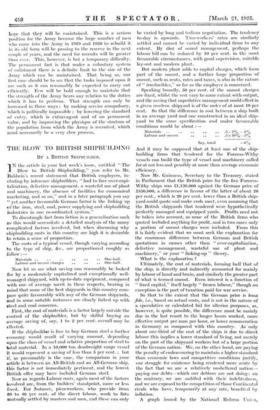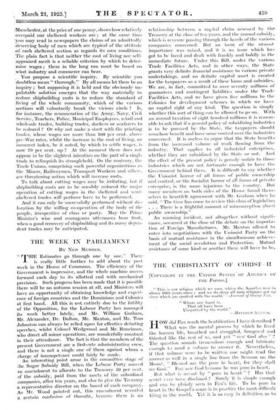1 N the article in your last week's issue, entitled
" The 1. Blow to British Shipbuilding," you refer to Mr. Baldwin's recent statement that British employers, in- cluding by inference shipbuilders, " had to face over-capi- talization, defective management, a wasteful use of plant . and machinery, the absence of facilities for economical marketing, and so on," and in a later paragraph you say " yet another favourable German factor is the linking up of the iron, steel, coal, power supplying and shipbuilding industries in one co-ordinated system."
To disentangle fact from fiction in a generalization such as this would necessitate a detailed analysis of the many complicated factors involved, but when discussing why shipbuilding costs in this country are high it is desirable to retain a sense of proportion. The costs of a typical vessel, though varying according to the type of ship, &c., are proportioned roughly as follow :- Materials .. • • • • .. One-half. Labour and oncost charges .. One-half.
Now let us see what saving can reasonably be looked for by a moderately capitalized and exceptionally well- managed shipyard, with up-to-date equipment, compared with one of average merit in these respects, bearing in mind that some of the best shipyards in this country com- pare quite favourably with any of the German shipyards, and in some notable instances are closely linked up with steel and coal concerns.
First, the cost of materials is a factor largely outside the control of the shipbuilder, but by skilful buying an average saving of, say, 1 to 2 per cent. overall may be effected.
If the shipbuilder is free to buy German steel a further economy would result of varying amount, "depending Upon the class of vessel and relative proportion of steel to total material. In a 10,000 ton deadweight cargo vessel it would represent a saving of less than 5 per cent. ; but if, as presumably is the case, the comparison in your article is between an All-British and an All-German ship, this factor is not immediately pertinent, and the lowest British offer may have included German steel.
Now as regards Labour costs, again most of the factors involved are, from the builders' standpoint, more or less fixed. For Instance, pieceworkers, who provide -from 80' to 40 per cent, of the direct labour, work to lgts mutuallyiettled by masters -and men, and these can only be varied by long and tedious negotiation. The. tendency to-day is upwards. Timeworkers' rates are similarly settled and cannot be varied by individual firms to any extent. By dint of sound management, perhaps the labOur bill can be reduced by 10 per cent. in the most favourable circumstances, With good 'supervision, suitable lay-out and modern plant. But modern plant adds to capital charges, which fOrm part of the oncost, and a further large' proportion 'of oncost, such as rents, rates and taxes, is alsoln the nature of " irreducibles," so far as the employer is concerned: Speaking broadly, 50 per Cent. of the oncost charges are-fixed, whilst the rest vary to some extent with output, and the saving that superlative *management could effect in a given modern shipyard is of the order of at most 10 per cent. So that the difference in cost between a ship built in an average yard and one constructed in an ideal ship- yard to the same specification and udder favourable conditions would be about :- Materials .. • • • • .. .5 x 2% Labour and oncost • • Say, total =6% And it may be supposed that at least one of the ship- building firms that tendered for the Furness-Withy vessels can build the type of vessel and machinery called for at not less and possibly at more than average economic efficiency.
Now Mr. Guinness, Secretary to the Treasury, stated in Parliament that the British price for the five Furness- Withy ships was £1,150,000 against the German price of £850,000, a difference in favour of the latter of about 26 per cent., which is 20 per cent. lower than a British ship- yard could quote and make ends meet, even assuming that the British shipyards that tendered were hypothetically perfectly managed and equipped yards. Profits need not be taken into account, as none of the British firms who quoted included anything for profit, and in two cases only a portion of oncost charges were included. From this it is fairly evident that we must seek the explanation for the enormous difference between German and British quotations in causes other than " over-capitalization, defective management, wasteful use of plant and machinery," or your " linking-up " theory.
What is the explanation ?
Ultimately, the cost of materials, forming half that of the ship, is directly and indirectly accounted for mainly by labour of hand and brain, and similarly the greater part of what is termed oncost. Even interest is a function of " fixed capital,". itself largely " frozen labour," though an exception is the part of taxation paid for war service.
So that to the extent that the German price is bona fide, i.e., based on actual costs, and is not in the nature of a speculative or calculated bid .for ulterior purposes, as, however, is quite possible, the difference must be mainly due in the list resort to the longer hours worked, more effective output per 'man per hour, or lower remuneration in Germany as compared with -this country. ''As-only about one-third of the cost of the ships is due to direct labour this implies a lower standard of living, not merely on the part of the shipyard workers but of a large portion Of the German nation. We, on the other hand, are paying the penalty of endeavouring to maintain a higher standard than economic laws and competitive conditions justify, our struggle for existence being rendered more acute by the fact that we are a relatively unsheltered nation— paying our debts—which our debtors are not doing ; on the contrary, we are saddled with their indebtedness, and we are exposed to the competition of those Continental rivals who have, temporarily at any rate, benefited by inflation.
" A graph issued by the. National Reform Unicii, Manchester, at the price of one penny, shows how relatively loverpaid our sheltered workers are ; at the same time ',you may read in newspapers the claims of an admittedly :deserving body of men which are typical of the attitude of each sheltered section as regards its own conditions. The plain fact is that neither the cost of living nor self- appraised merit is a reliable criterion by which to deter- mine wages ; these in the long run must be based on ;what industry and commerce can bear.
You propose a scientific inquiry. By scientific you doubtless mean " thorough." By all means let there be an inquiry ; but supposing it is held and the obviously un- palatable solution emerges that the way materially to .reduce shipbuilding costs is to reduce the standard of living of the whole community, which of the various sections will voluntarily break the vicious circle ? Is, Tor instance, the remuneration of the Army, Navy, Civil Service, Teachers, Police, Municipal Employees, retail and wholesale trades, building trades, dockers or seafarers to be reduced ? Or why not make a start with the printing trades, whose wages are more than 100 per cent. above pre-War rates, whilst the increase in the cost of living, an incorrect index, be it noted, by which to settle wages, is now 79 per cent. up ? At the moment there does not appear to be the slightest intention on the part of a single trade to relinquish its stranglehold. On the contrary, the .Trade Unions, comprising such powerful organizations as the Miners, Railwaymen, Transport Workers and others, Are threatening action which will increase costs.
To talk about cutting wages may be irritating, but if shipbuilding costs are to be sensibly reduced the major operation of cutting wages in the sheltered and semi- sheltered trades will perforce have to be performed.
And it can only be successfully performed without dis- location by the willing co-operation of the body of the people, irrespective of class or party. May the Prime Minister's wise and courageous utterances bear fruit, when a good recovery of shipbuilding and its many depen- dent trades may be anticipated.























































 Previous page
Previous page